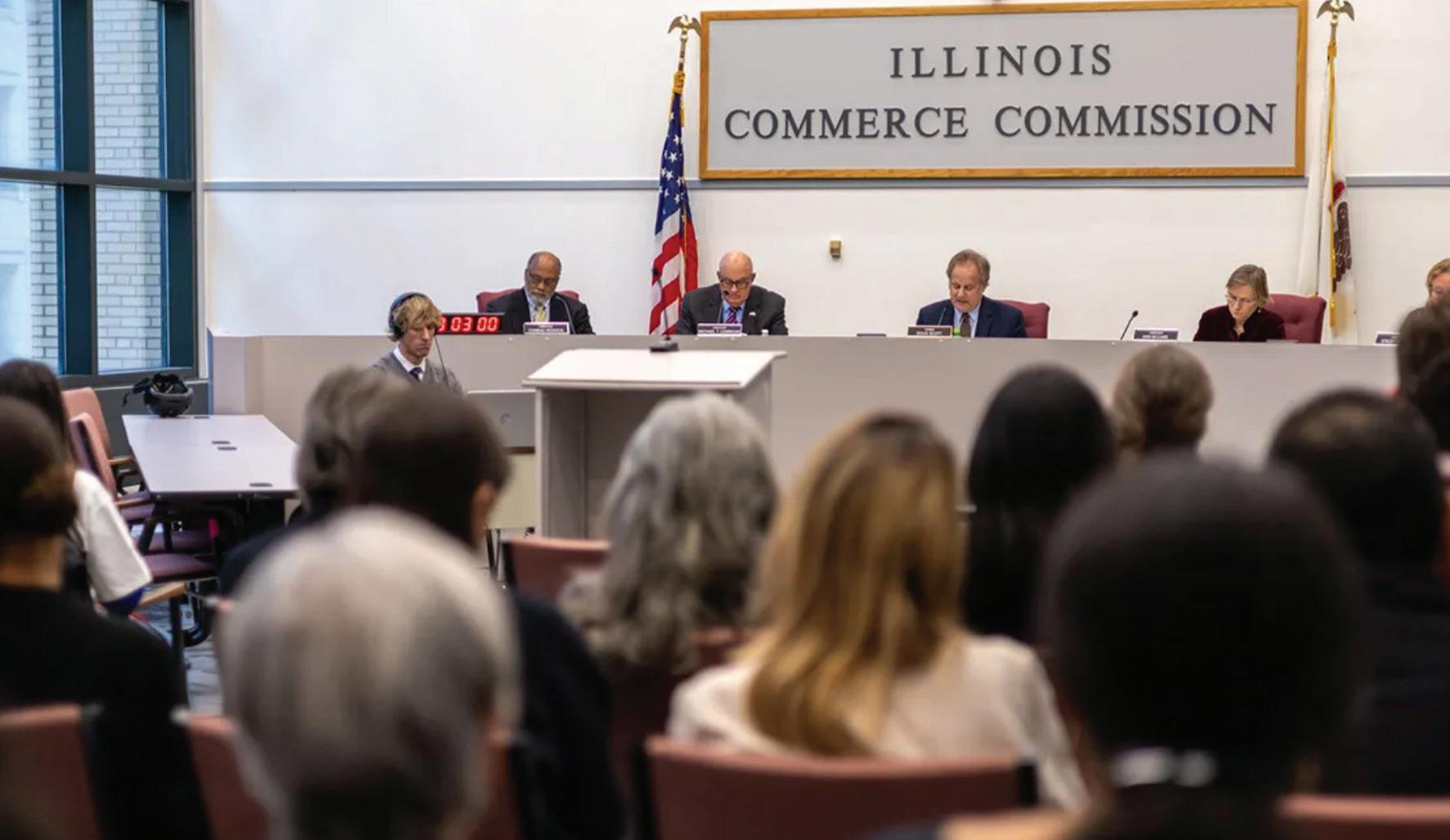

Grayson to remain jailed as state Supreme Court considers release request
Former Sangamon County deputy had sought less restrictive pretrial conditions
By BETH HUNDSDORFER Capitol News Illinois
The Illinois Supreme Court declined to issue an order to release former Sangamon County Sheriff’s Deputy Sean Grayson as it considers whether to hear an appeal regarding his pretrial detention.
Grayson is charged with first-degree murder for killing Sonya Massey inside her home near Springfield on July 6.
Sangamon County State’s Attorney John Milhiser petitioned for Grayson to be detained after he was initially charged in July, and he has been in custody ever since. But an Illinois appellate court found in November that a circuit judge erred when finding Grayson should remain in jail because prosecutors failed to provide evidence that Grayson was an ongoing threat to the public, even though he was no longer a police officer.
Milhiser stated in his request to appeal the ruling that the appellate court gave undue weight to a pretrial assessment tool that calculates risk to the public if a defendant is released pending trial. Grayson failed to disclose his two previous driving under the influence convictions that would have changed his score
vfpress.news

Regulators OK Statewide Electric Grid Upgrades, Rate Increases
Decision comes after state rejected utilities’ original grid plans last year
By ANDREW ADAMS Capitol News Illinois
Illinois utilities are set to invest more than a billion dollars into upgrading the state’s electric distribution grid, resulting in higher rates for customers around the state.
The Illinois Commerce Commission on Thursday approved scaled-back plans submitted by Commonwealth Edison and Ame-
ren Illinois, the electric utilities for northern and southern Illinois, respectively.
The plans outline the next three years of infrastructure upgrades, laying out how the companies will roll out new technologies to meet the state’s clean energy goals and maintain existing infrastructure.
Regulators approved $1.5 billion in spending for ComEd, a 25% reduction from their original plan. They also approved $83 million of a requested $333 million in spending
at Ameren, a 75% reduction. Ameren also had some additional spending approved earlier this year due to a procedural appeal of a previous ICC decision.
The ComEd plan includes an average increase in residential bills of about $22 per year each year between 2024 and 2027, when the company is expected to file a new grid plan.
CAPITOL NEWS ILLINOIS PHOTO BY ANDREW ADAMS
Illinois Commerce Commission Chair Doug Scott (third from left) reads a 2023 decision rejecting grid plans from Commonwealth Edison and Ameren Illinois. Revised versions of those plans were approved Thursday.

Publisher/CEO Michael Romain
Chief Operations Officer Kamil Brady
Creative Designer Shanel Romain

HOW TO REACH US
John Wilk Communications, LLC
3013 S. Wolf Rd. #278
Westchester, IL 60154
PHONE: (708) 359-9148
VFPress.news
TWITTER: @VILLAGE_FREE
FACEBOOK: @MAYWOODNEWS

GRID UPGRADES
Original plans rejected from page 1
Ameren has not released a final cost estimate for its 1.2 million customers, but officials at the company say the decision will increase bills by less than a dollar per month.
These increases are on top of those approved in 2023 as part of separate multiyear “rate plans.” Both the grid plans and new ratemaking process are part of the 2021 Climate and Equitable Jobs Act, landmark climate legislation that set Illinois’ goal of decarbonizing the electric grid by 2045.
But the companies initially struggled to meet that act’s requirements. ComEd and Ameren filed grid plans in early 2023 with the goal of having them approved at the end of that year.
this maintenance work has also changed due to an increased focus on the grid’s “resilience” in the face of severe weather events around the state.
Some state officials are beginning to worry about the long-term prospects for Illinois’ clean energy goals – particularly the future for clean energy generation and long-range transmission. But these grid plans, which focus on the local distribution network, were hailed by several advocates and regulators as a win for the state’s clean energy policy.
The regulatory cases, which function like court proceedings, had several groups submit testimony and arguments that ICC commissioners weighed in their final decision. These groups included consumer advocates, environmental groups, the state and businesses that have an interest in energy policy.
The Village Free Press is published digitally and in print by John Wilk Communications LLC. The print edition is distributed across Proviso Township at no charge each week. © 2024 John Wilk Communication LLC

But in a rare and surprising move, commissioners at the ICC rejected those plans on a split vote. At the time, they said the companies didn’t meet legal requirements to prove that their plans were “cost effective” for customers and directed the two utilities to refile updated versions.
Over the past nine months, regulators, state officials, consumer advocates and environmental groups have litigated and debated the revised plans, and the commission approved modified versions Thursday.
Representatives of both companies said they’re still reviewing the decisions but indicated they were happy to have more certainty for the next few years of infrastructure spending.
“Our primary focus remains our commitment to providing safe, reliable, affordable and sustainable energy to our customers and communities,” ComEd spokesperson John Schoen said in a statement.
Ameren officials said their plans to install upgrades and replace aging infrastructure will be good for customers in the long run, even if it comes with upfront costs.
“It is a ‘pay now or pay more later’ proposition,” Matt Tomc, who manages Ameren’s regulatory policy, told Capitol News Illinois.
The upgrades laid out in the two plans are notable because many of them are aimed at making electric distribution easier as the state moves toward relying on more renewable energy sources. This includes new methods of managing distributed energy generation – like rooftop and community solar projects.
The plans also include more traditional spending on “poles and wires” – the distribution infrastructure that brings electricity to homes and businesses. Tomc noted
Brad Klein, managing attorney at the Environmental Law & Policy Center, worked on the case and told Capitol News Illinois he was pleased with the collaborative approach that the state is taking to meet its climate goals and improve the electric grid.
“We hope this becomes a model for other states,” Klein said.
As part of this process, ComEd signed a memorandum of understanding with ELPC and several other groups to share data and work with them on future grid planning projects. Klein noted that while Ameren doesn’t have that formal obligation, it made similar commitments to ComEd. Consumer advocates at the Citizens Utility Board, which also took part in the case, acknowledged that the decisions were a “step in the right direction” to limit what they called “wasteful” utility spending.
“In the face of foot-dragging by Illinois’ biggest electric utilities, this ICC has shown concern for affordability and reducing reckless utility spending,” CUB spokesperson Jim Chilsen said in a statement.
“Of course, an increase of any kind will be difficult to bear for far too many customers who have been hit with multiple utility rate hikes over the last decade. We still have a lot of work to do to secure a clean, affordable energy future for Illinois consumers.”
ICC Chair Doug Scott called the decisions a “first step” and said future plans will be “refined and improved.”
Other commissioners noted that they expect continued collaboration between the utilities and others involved in the process.
“The work is not done,” ICC Commissioner Conrad Reddick said. “Today’s orders ask more of all the stakeholders. … CEJA mandates stakeholder workshops with wide participation, informed debate and robust discussion as the engine of that work.”
GRAYSON Seeking bail
from page 1
on that assessment, according to the court document, which also noted “the mere fact that defendant was no longer a police officer did not mitigate his risk.”
The appellate court on Nov. 27 ordered the circuit court to hold a new detention hearing to consider whether there were conditions, such as home detention or supervision, that would address concerns for public safety while allowing for Grayson’s release.
But before that hearing was held, prosecutors asked the Supreme Court to intervene.
The Supreme Court has not yet decided whether it will consider Grayson’s case, which could prove to be an early test of the state’s SAFE-T Act. That law eliminated cash bail effective September 2023.
The SAFE-T Act’s pretrial detention provisions allow judges to detain individuals who have been charged with certain crimes while they await trial, provided the individual is a threat to a person or the community

A Macon County Sheriff’s Office mugshot of Sean Grayson was taken on Oct. 24. Grayson, a former Sangamon County Sheriff’s deputy, is charged with the first-degree murder of Sonya Massey, an unarmed Black woman.
and there are no other less restrictive methods that could ensure public safety.
Grayson’s attorneys argued that the Supreme Court should issue a supervisory order directing the appellate court to promptly “set the case for a hearing to determine the least restrictive conditions of defendant’s
WE’VE STEPPED OUR GAME UP EVEN MORE.







pretrial release.”
Earlier this month, the Supreme Court decided not to issue that supervisory order. That means Grayson will remain jailed as the appeal makes its way through the courts.
An email from the offices of attorneys Benjamin Crump and Antonio Romanucci,
who represent the Massey family, praised the Supreme Court’s decision in a statement.
“The Illinois Supreme Court’s decision to deny Sean Grayson’s release is a relief for Sonya Massey’s family,” the lawyers said in a statement. “By upholding their responsibility to prioritize public safety, the court has sent a powerful message that the rights and safety of the community must come first and accountability must be pursued.”
After his arrest, Grayson was housed in the Menard County Jail, but in late October, he was transferred to the larger Macon County Jail in Decatur. He was diagnosed with cancer and continues to receive treatment while there.
Massey, a Black woman, called police on July 6 to report a prowler outside her home. Grayson, who is white, shot an unarmed Massey in her kitchen. Massey was experiencing a mental health crisis at the time of her death, according to a family spokesperson.
Grayson worked for six central Illinois law enforcement agencies in four years. He worked for the Sangamon County Sheriff’s Office for just over a year when he was fired after being charged with murder.
See Dr. Hur for expert foot and ankle care.






Whether you’re an elite athlete or simply enjoy being active, Dr. Hur will accurately diagnose and treat your unique condition, helping relieve pain and restore function to your foot and ankle.
Areas of Expertise:
• Minimally invasive foot and ankle surgery
• Total ankle arthroplasty
• Deformity correction
• Sports-related injuries
• Fracture care

Schedule an appointment in Joliet, Westchester, or Chicago.
